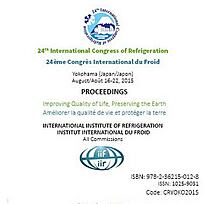
Document IIF
Développement d'un nouveau réfrigérateur magnétique rotatif.
Development of a novel rotary magnetic refrigerator.
Numéro : pap. n. 488
Auteurs : LOZANO J. A., CAPOVILLA M. S., TREVIZOLI P. V., et al.
Résumé
A novel rotary magnetic refrigerator was designed and built at the Federal University of Santa Catarina (UFSC). The optimally designed magnetic circuit is a two-pole system in a rotor-stator configuration with high flux density regions of approximately 1 T. Eight pairs of stationary regenerator beds filled with approximately 1.7 kg of gadolinium, Gd, spheres (425-600 µm diameter) were placed in the magnetic gap. Two low-friction rotary valves were developed to synchronize the hydraulic and magnetic cycles. The valves were positioned at the hot end to avoid heat generation in the cold end. In this work, experimental results are presented as a function of the operating frequency, fluid flow rate, hot reservoir temperature and thermal load. The performance of the device was evaluated in terms of the coefficient of performance (COP) and the overall second-law efficiency (??2nd). The maximum no-load temperature span was 12 K at 1.5 Hz and 150 l/h, and the maximum zero-span cooling power was 150 W at 0.8 Hz and 200 l/h. For a thermal load of 80.4 W, at 0.8 Hz and 200 l/h, the device generated a temperature span of 7.1 K, with a COP of 0.54 and a ??2nd of
1.33%.
Documents disponibles
Format PDF
Pages : 8 p.
Disponible
Prix public
20 €
Prix membre*
Gratuit
* meilleur tarif applicable selon le type d'adhésion (voir le détail des avantages des adhésions individuelles et collectives)
Détails
- Titre original : Development of a novel rotary magnetic refrigerator.
- Identifiant de la fiche : 30015947
- Langues : Anglais
- Source : Proceedings of the 24th IIR International Congress of Refrigeration: Yokohama, Japan, August 16-22, 2015.
- Date d'édition : 16/08/2015
- DOI : http://dx.doi.org/10.18462/iir.icr.2015.0488
Liens
Voir d'autres communications du même compte rendu (657)
Voir le compte rendu de la conférence
Indexation
-
An experimental study on performance of Li-Fe-C...
- Auteurs : SINGH P., SRIKANTI K., CHANDRA M., GOPALAN R., SESHADRI S.
- Date : 2022
- Langues : Anglais
- Source : 2022 Purdue Conferences. 19th International Refrigeration and Air-Conditioning Conference at Purdue.
- Formats : PDF
Voir la fiche
-
New magnetic refrigeration prototype with appli...
- Auteurs : MONFARED B., PALM B.
- Date : 11/09/2016
- Langues : Anglais
- Source : 7th International Conference on Magnetic Refrigeration at Room Temperature (Thermag VII). Proceedings: Turin, Italy, September 11-14, 2016.
- Formats : PDF
Voir la fiche
-
Experimental studies with an active magnetic re...
- Auteurs : ERIKSEN D., ENGELBRECHT K., BAHL C., et al.
- Date : 16/08/2015
- Langues : Anglais
- Source : Proceedings of the 24th IIR International Congress of Refrigeration: Yokohama, Japan, August 16-22, 2015.
- Formats : PDF
Voir la fiche
-
Thermal and power design consideration for high...
- Auteurs : KIM M-S., KUK K., MUN I-J., et al.
- Date : 07/09/2014
- Langues : Anglais
- Source : 6th International Conference on Magnetic Refrigeration at Room Temperature (Thermag VI). Proceedings: Victoria, Canada, September 7-10, 2014.
- Formats : PDF
Voir la fiche
-
Design and construction of an experimental rota...
- Auteurs : APREA C., CARDILLO G., GRECO A., et al.
- Date : 07/09/2014
- Langues : Anglais
- Source : 6th International Conference on Magnetic Refrigeration at Room Temperature (Thermag VI). Proceedings: Victoria, Canada, September 7-10, 2014.
- Formats : PDF
Voir la fiche
